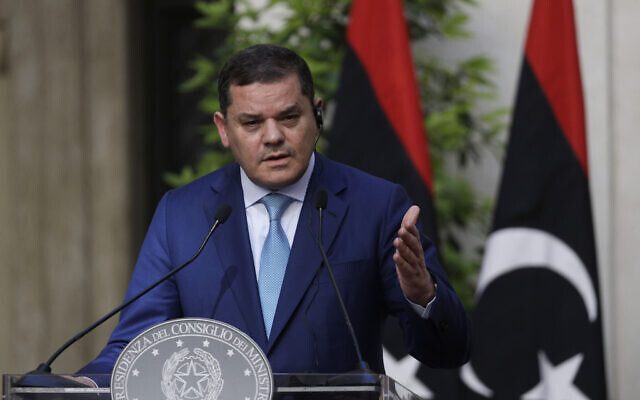The Lebanese daily Al-Akhbar has obtained a classified diplomatic cable confirming that Libyan Prime Minister Abdul Hamid Dbeibeh met David Barnea, the head of the Israeli Mossad, to discuss “practical steps to normalize relations” between the two countries last year in Amman, Jordan.
The meeting specifically focused on “the possibility of Israeli political and military support for Dbeibeh”, who controls the western regions in Libya. In exchange, Libya would become a part of the Abraham Accords.
Major General Ahmad Husni, the director of Jordanian intelligence, was responsible for ensuring the meeting was held in “absolute secrecy.” The document also specifies that “this conversation was arranged in cooperation with Jordan and the United Arab Emirates under the supervision of the United States.”
According to the report, the UAE took part under the condition that a possible normalization agreement also included the Khalifa Hafter government controlling eastern Libya’s regions and is supported by Abu Dhabi.
Monday’s discovery comes in the face of the Dbeibeh government’s position after last week’s diplomacy failure by Israel’s foreign ministry after revealing the details of a private meeting between the top Israeli diplomat and the Libyan foreign minister Najla Mangoush in Rome.
Following the ensuing crisis, Dbeibeh’s office claimed not to know of the meeting, as did Israeli Prime Minister Benjamin Netanyahu’s office. Still, after Mangoush lost her position and was forced to flee Libya, she confirmed that both country’s prime ministers approved her discussions with Israeli Foreign Minister Eli Cohen.
Also, last week, two Libyan officials told the AP the Dbeibeh government also met with CIA director William Burns last January in Tripoli. The discussions focused on Libya normalizing relations with Israel following the meeting with the Mossad chief in Jordan.
According to the diplomatic cable that Al-Akhbar obtained, Mangoush and Dbeibeh are not the only Libyan officials being approached about Israeli normalization. According to reports, there are also diplomatic channels with Aguila Saleh Issa, the speaker of the House of Representatives in eastern Libya, and Khaled al-Mishria, the president of the Libyan Council of State, based in western Libya.
The Israeli blunder last week disturbed U.S. officials in Washington. Senior Israeli officials were chastised by the Biden administration who said foreign minister Cohen’s “irresponsible behavior” endangered efforts of accelerating normalization deals between the Israelis and Arab countries.
Former Libyan President Muammar al-Gaddafi strongly supported the Palestinian cause. Since 1957, Libyan law has made it illegal to have any kind of formal relations with the Israeli government.






Leave a Reply